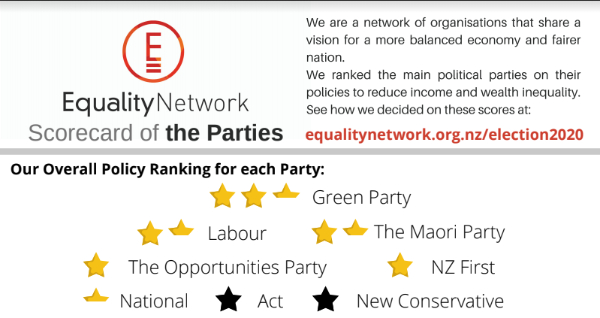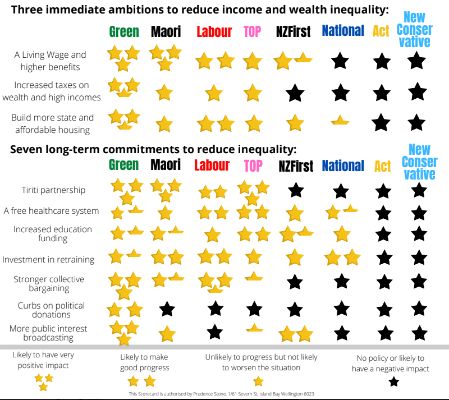A Star Chart For The Parties On Their Promises To Reduce Inequality
Eight major Parties have been scrutinised for their commitment to addressing inequality with policies proven to reduce wealth and income inequality. The Equality Network, a group of New Zealand organisations united by the vision of a more equal Aotearoa New Zealand, have released their Party Scorecard, giving up to three gold stars, for policies likely to have a very positive impact, or a black star for no policy, or policies likely to have a negative impact.
Best overall ranking was given to the Green Party with two and a half stars for having the most policies likely to make progress toward reducing inequality. Coming second were Labour and the Māori Party with one and a half stars each. Both NZ First and the Opportunities Party scored one star for policies that were unlikely to progress but also not likely to worsen the situation. National was granted just half a star while Act and New Conservative were given black stars for their suite of policies.
A Living Wage and higher benefits to those needing income support were two priority asks and the high score of three stars went to both the Green Party and the Māori Party, while National, Act and New Conservatives scored black stars.
Each election the network hopes their scores for the Parties support and inform voters’ decision-making about who gets to form a new government.
Video link: https://youtu.be/xn4PDz8Lqaw
“Income inequality has been one of the top social issues over recent years – consistently rating among the main problems that New Zealanders are concerned about. Insufficient household incomes are at the heart of this matter,” says Paul Barber of Salvation Army, one of the Equality Network’s four Scorecard analysts. “It’s good to see a number of Parties committed to raising the minimum wage.”
Fairer tax law and higher taxes for the wealthiest New Zealanders would go a long way to providing government agencies like Work and Income more means to provide New Zealand’s safety net, so this measure is the second priority ask on the Scorecard. As far as its analysts were concerned there were a disappointing number of black stars given to the Parties in this area.
“Taxing wealth as well as income is important because we know many wealthy New Zealanders report lower incomes to avoid taxes, while their assets continue to roll over with interest,” says Peter Malcolm of Closing the Gap and one of the Scorecard’s analysts. “The Green Party really shone with its gold stars, promising strong wealth tax policy as well as new top tax rates for people earning the highest incomes, amidst mostly black stars for other Parties.”
Fixing New Zealand’s housing crisis is the Equality Network’s third priority ask, with the scorecard committee specifically looking for Party measures to clear the existing social housing waiting list and providing more healthy, affordable homes with long term tenure.
“Only if a new Government takes immediate action after the election to fix the housing crisis and improve the nation’s housing stock, will we start to see reductions in child poverty and improvements in health,” said Dr Prudence Stone, another Scorecard analyst. “Sadly no Party got three stars for both aspects of this priority ask, although the Green Party’s promise of 5000 homes per annum for 5 years is explicitly to clear the social housing waiting list. Once again the Green Party scored highest in this area.”
As well as these three immediate measures, seven more areas for longer term commitments are scored, all of which will pave a longer term strategy for how resources are shared to the benefit of us all. These include: full partnership between Māori and the Crown, a free healthcare system, increased education funding for free quality education, huge boosts to retraining and job skills programmes, collective bargaining laws, curbs on political donations and broadcasting that serves the public interest.
Video link: https://youtu.be/e7vincbo4_Q
“New Zealand’s response to Covid 19 has really put pressure on our health system, our education system, and thrown our job market into disarray. Racism, too, is an issue for New Zealand that would be resolved with better collective knowledge and adherence to te Tiriti o Waitangi,” said Jo Spratt from Oxfam and Convenor of the Equality Network. “These are social determinants driving income and wealth inequality and so they’re important to monitor within each Party’s values and policy lines.”
Parties are mainly assessed based on their ambition (how strongly they are committed to tackling inequality) and their plan (the level of detail they have for policies to reduce income and wealth imbalances) based on information published by the parties and summaries from independent election websites.
These scores are accurate as at October 1 5pm. The committee will endeavour to update scores as new policies are released by each Party. For more information visit the Equality Network website: equalitynetwork.org.nz/election 2020


Read the policy matrix here.


 Gordon Campbell: On The West’s War Against Iran
Gordon Campbell: On The West’s War Against Iran NZ Government: Targeted Action On Suicide Prevention
NZ Government: Targeted Action On Suicide Prevention NZ Labour Party: Luxon Open To Halving Workers’ Sick Leave
NZ Labour Party: Luxon Open To Halving Workers’ Sick Leave NZCTU: Government Turns Its Back On Workers’ Safety
NZCTU: Government Turns Its Back On Workers’ Safety Auckland Council: Experienced Property Owners Convicted For Persistent RMA Breaches Across Auckland Homes
Auckland Council: Experienced Property Owners Convicted For Persistent RMA Breaches Across Auckland Homes EDS: Government Undermines Regional Powers To Protect Coastal Biodiversity
EDS: Government Undermines Regional Powers To Protect Coastal Biodiversity Greenpeace: Shane Jones Indicates NZ's Entire EEZ Now Open For Oil And Gas Free-for-All
Greenpeace: Shane Jones Indicates NZ's Entire EEZ Now Open For Oil And Gas Free-for-All


